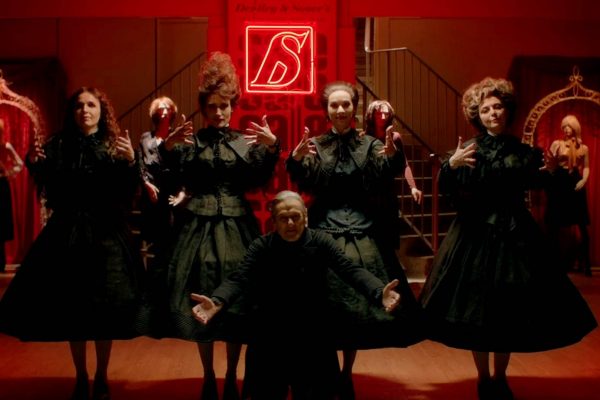@Filmhouse, Edinburgh until Thu 11 Jul 2019.
Few filmmakers wear their influences so resolutely on their sleeves while being utterly themselves as Peter Strickland. Elements of Lynch, Argento and British TV of the 70s are channelled into strange, incantatory experiences that luxuriate in heightened sensations and visual mischief rather than narrative coherence. His latest is perhaps his most strange yet, the creepy, camp and comedic satire of a killer red dress that will baffle most but will enchant others with its hazy, sleazy charms.
In what may be a parallel England in the 70s, divorced Sheila (Marianne Jean-Baptiste) is looking for love again by trawling the lonely hearts columns. Having chosen a likely candidate, she needs some new threads. Enter Dentley & Soper’s department store and its hypnotic, sinister TV advert. Sheila is drawn to the place, where she’s talked into buying a cursed dress by the seductively prolix Miss Luckmoore (Fatma Mohamed). In a bisected narrative the dress also makes its presence felt to washing machine repairman Reg (Leo Bill), and his fiancee Babs (Hayley Squires).
We’ve often seen the means of production fetishised in films; not so often the methods of consumption. From the halls of commerce themselves to the sales patter (sample: “The hesitation in your voice seems to be an echo in the recesses of retail.”), to the purchases themselves. Everything is a transaction, and every transaction is given near-mystical significance. There are menstruating mannequins, bizarre workplace evaluations, and a litany of washing machine parts that can induce a trance in those who hear it. It’s quite possibly the best comment on capitalism in a horror film since the legendary Dawn of the Dead.
In Fabric is both occasionally horrific and very, very funny, yet the term comedy-horror doesn’t fit the film quite as well as its murderous dress fits anyone who dons it. Instead its a loving pastiche of the garish, the grotesque, and the gorgeous elements of 70s film and TV. Unlike much of the fashion for retro pop culture, adopting the aesthetic of the period isn’t the end in itself. Instead, Strickland fastidiously gathers these fragments for a tactile and potent mosaic that is unlike anything made by any other filmmaker today.
The second half doesn’t leave quite the impression of the first. This isn’t at all down to anything lacking in the performances of Bill and Squires (although Jean-Baptiste is outstanding). It’s simply that the film relies on the repetitions and rhythms that it takes such pains to establish. It takes a while to get over the initial strangeness and become acclimatised to its skewed internal blueprint. Once this is interrupted by the culmination of the first story, we have to start from square one, and the second part simply isn’t quite as good. In a Q&A after a preview screening, Strickland revealed the film comprises two of six tales he wrote that featured the dress. It seems we were possibly denied a Tales of the Unexpected-style anthology show. A pity maybe, but this decadent pair certainly do for now.
Though rendered slightly baggy by its two tales, In Fabric is a unique and entertaining slice of arch weirdness that will further enhance Peter Strickland’s cult reputation. Like his other films such as Berberian Sound Studio and The Duke of Burgundy, there are similar preoccupations and influences in the mix, but he has the knack in making each one thoroughly distinctive. In Fabric is a superior patchwork garment that every genre fan should try on for size.
